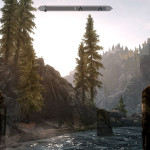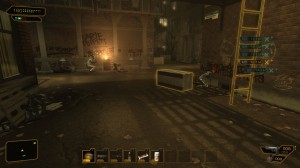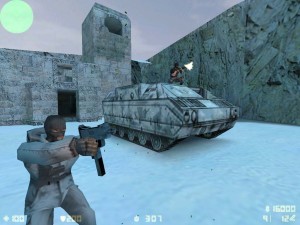Open-world games like Skyrim or GTA create increasingly complex environments to explore. Whether an evil dual-wielding barbarian or Russian heartbroken thug, the gamer’s playstyle is often characterized by certain underlying tendencies and patterns, reflecting his unique personality traits. But if games can reveal our personality, could they also not be used to fundamentally change it?
It’s not the role we play, it’s how we play it

The big draw of games such as Ultima, Morrowind or Fallout 3, is the vast world to explore and interact with. While such worlds may not be as intricate as ours and often contain arbitrary rules (such as invisible walls or shopkeepers happily buying any and all sort of useless junk), they nonetheless create a physical, social and economical space complex enough for the player’s underlying personality traits to emerge.
I am not talking simply about the surface-level decisions, such as good vs. evil, or choosing sneaking over guns-blazing. Games have always been heralded as an escape from reality, allowing the player to become what he could not in real life. Rather than the role the player chooses, lets look at how the player enacts his role and interacts with the complex game mechanics.
For example, some players lose track of the main quest, exploring the vast landscapes and checking every nook and cranny, while others focus primarily on the main story ignorant of anything outside their path. Some lean towards investing in long-term, powerful but expensive items such as stronger weapons and armor, while others rely more on short-term reusables like potions and temporary stat boosters. And further still, some multitask by accepting numerous quests at a time, while others take them slowly, one at a time. With so much freedom to interact with the game mechanics, isn’t the approach taken by the player reflective of who they are in real life?
Reflecting our Traits

In my case, my love for biking and urban-exploration was mirrored in Skyrim, where I never completed the main quest because there were too many interesting vistas and locations to explore. Upon entering new areas in Deus Ex I would often mentally map out the environment, noting all usable objects, pathways, and characters, before making any decisions – again, just an example of my real-life tendency to plan ahead and organize, rather than rush head-in and figure things as they come. And lastly, even my “buying policy” in games such as Final Fantasy, where I find myself reluctant to purchase expensive gear, is a reflection of my frugal personality, where I cringe at any bigger spending even if I can easily afford it.
The idea that one can gleam into player’s mind via his playstyle may not be revolutionary, but the implications are only beginning to be explored. If one’s in-game avatar is reflection of their psyche, wouldn’t making changes to their playstyle affect their real world behavior as well?
So can Games Change Who We Are?
On the academic side, virtual reality has already been successfully used to help people suffering from arachnophobia at least partially overcome their fear of spiders. Similar studies have been applied to a fear of heights as well, and undoubtedly games could be used to explore and treat other disorders too.
Taking this a step further, realistic open world games could be consciously used to test the viability of real life decisions and reinforce desired personality changes. Looking back at my own frugality in life and in games, a form of obsessive-compulsive hoarding, I would always stock up on cash and items, beating the game as a billionaire with 50 unused mega-elixirs. So I did a little experiment. In my last playthrough of The Witcher 2, Skyrim and currently Fallout New Vegas, I have been forcing myself to use up my items and cash if I had them. As I have discovered, finding the balance between spending and acquisition of cash in games proved a good argument for rationalizing big real-life purchases as well.
Another unintended change was my first ever game of Paintball. Initially I got mauled, unsure of how to proceed or properly operate the gun. Until I remember something – several years of online FPSes. And so I began moving from cover to cover, leaning around corners, crouching to minimize my size, holding my breath to steady my aim, sneaking on an enemy from behind, and occasionally madly rushing and zig-zagging to throw off opponent’s aim. All of this quickly became second nature.

After a few successful kill streaks I realized – dear god, the tactical training of Counter Strike carried over to real life paintball! And I am not the only one to realize this potential of games – Operation Flashpoint started its life as VBS1, a realistic simulation used by the US military.
The psychological changes can definitely carry from virtual to real world, whether it’s easing our obsessive-compulsiveness tendencies, overcoming irrational phobias, or improving tactical thinking. If we begin to think of games as tools or real-life-simulations, we can consciously use them to promote desired changes in our own personality.
Gamification of Life
A tangential idea worth mentioning here is “gamification of life”, that is applying game concepts directly to real life. The Extra Credit guys have made an excellent video about how gamification can be used in education, transforming the “boring” school into an exciting game of ever-growing “stats” (grades) and hidden rewards. Framing education in such a way, they argue, can encourage students to study harder, much the same way Diablo encourages gamers to spend yet another evening grinding for “phat loot.”

Another example are online fitness trackers. Many people keep track of their body weight, calories burned and exercises performed. As I looked at my spreadsheet after a few months, I suddenly realized something – my little log was, in a way, my real-world character-sheet! The excitement of seeing one’s body weight go down or the average running speed go up mirrors the excitement of the RPG “level up” screen. It is a fantastic motivator.
Lets also not forget the whole sphere of Facebook games like FarmVille or the numerous MMORPGs, which further creep into and merge with our social space. Because the extra few corn crops are just one converted friend away. Cracked.com provides an excellent tongue-in-cheek article on the 5 Creepy Ways Video Games Are Trying to Get You Addicted that sheds more light on this topic.
So what does that all mean?
In short, games, thanks to their complex and semi-realistic worlds, have far greater potential than just playing them. If we look beyond the simple role we choose in an RPG, we can learn a lot about some of our fundamental traits. By recognizing and changing our in-game behavior, we can influence real-life personality change as well. And with that, the gaming concepts can be (and have been) used directly in real life, helping students prepare better, motivate dieters or bodybuilders to stay on track, or even get the consumer to spend those extra few bucks. Needless to say, games have an amazing untapped potential in studying, analyzing and even changing human psychology.
But games need not only be limited to the individual; on a much bigger scale, Eve Online’s player-driven economy has seen megacorporations rise and fall, big mergers that monopolize markets, and of course the frequent cargo thefts not too dissimilar from what the Somali pirates are doing. Granted, analyzing Eve Online could warrant a whole research paper of its own, but it cannot be denied that the game’s economy is in many ways a parallel of the real one, showing how even humanity’s grand economical and societal patterns emerge in the simulated environment.